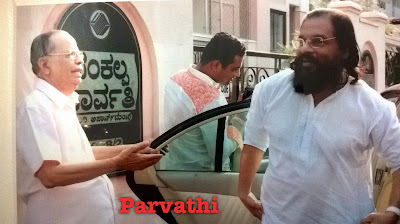Sangeetha Kalanidhi Vid. Sudha Raghunathan - Sri Ramanavami 2007
One of the favourites of the Parvathi audiences, and a celebrated concert artiste for over three decades, Vid. Sudha Raghunathan performed in 2007 at Parvathi to a full house. Unfortunately, the audio we can retrieve is a "hall recording" with significant sound degradation. However, the concert stands as a testament to Vid. Sudha's calibre and concert aesthetics.
We decided to ask Perplexity.AI to list five notable facts about Vid. Sudha. Here is what it told us!!!
Here are the five best things one can say about Vid. Sudha Raghunathan:One of India’s foremost Carnatic vocalists and a Padma Bhushan awardee: Sudha Raghunathan is widely recognized as one of the leading exponents of Carnatic music, having been honored with some of the country's highest civilian awards including the Padma Bhushan (2015) and Padma Shri (2004).Recipient of the prestigious Sangeetha Kalanidhi: She was awarded the Sangeetha Kalanidhi by the Madras Music Academy, a distinction regarded as the highest honor in Carnatic music, and she was among the youngest to receive it, marking a generational transition in the field.Innovator and global ambassador for Carnatic music: Sudha has evolved a distinctive style, blending tradition with innovation, and has performed at major venues worldwide, including being the only Carnatic musician after M.S. Subbulakshmi to sing at the United Nations. Her repertoire spans over 200 albums and includes forays into film and fusion music.Dedicated disciple and torchbearer of a legendary lineage: She is a direct disciple of the legendary Dr. M.L. Vasanthakumari, and has carried forward her guru’s legacy, both musically and in her approach to professionalism, resilience, and stage presence.Committed philanthropist and educator: Beyond music, Sudha Raghunathan has made significant contributions to society through her Samudhaaya Foundation, supporting numerous social causes including health, education, and disaster relief, and actively promoting music education and outreach.These qualities underscore her artistic excellence, pioneering spirit, and social commitment, making her a role model in the world of Indian classical music and beyond.
Concert Details
Sudha Raghunathan - Vocal
Sudha Raghunathan - Vocal
Mysore V. Srikanth - Violin
C. Cheluvaraj - Mridangam
M.A. Krishnamurthy - Ghatam
Date: 27 March 2007.
Sri Ramanavami Festival conducted at the home of "Parvathi".
Song List
- Shloka and Mathe Malayadhwaja - Khamach - Muthiah Bhagavatar
- Vatapi Ganapathim - Hamsadhwani - M. Dikshitar
- Shloka and Jaya Jaya Janakikantha - Nata - Purandaradasa
- Endaro Mahanubhavulu - Sriraga Pancharathna - Thyagaraja
- Nagumomu - Abheri - Thyagaraja
- Marivere Dikkevaraiyya Rama - Shanmukhapriya - Patnam Subrahmanya Ayyar
- Kurai Ondrum Illai - Ragamalika - Rajaji
- Shloka - Bhavayami Gopalabalam - Yamuna Kalyani - Annamacharya
- Gandhamu puyyaruga - Punnagavarali - Thyagaraja
- Ragamalika - Uga bhoga - Baro Krishnayya - Kanakadasa
- Viruttam - Rama Namame - Tanjavur Sankara Iyer
- Brahmam Okate - Bauli - Annamacharya
- Mangalam
























